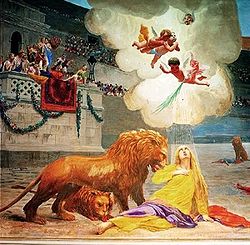Saint Euphemia
| Saint Euphemia | |
|---|---|

Mural depicting the martyrdom of St. Euphemia (Church of St. Euphemia, Rovinj, Croatia)
|
|
| Virgin, Martyr | |
| Died | 303 A.D. Chalcedon, Bithynia |
| Venerated in | Roman Catholic Church, Orthodox Church, Protestant Churches |
| Major shrine | Orthodox Patriarchal Cathedral of St. George, Istanbul, Church of St. Euphemia, Rovinj, Croatia |
| Feast |
September 16 (martyrdom) July 11 (miracle) |
| Attributes | Clothed as a pious woman with her head covered, surrounded by one or a few lions, often holding a wheel or a cross |
Saint Euphemia (Greek: Ευφημία Late Koine Greek [efiˈmia]), "well-spoken [of]", known as the All-praised in the Orthodox Church, is a Christian saint, who was martyred for her faith in 303 AD. According to Christian tradition, this occurred at Chalcedon.
According to tradition, Euphemia was arrested for refusing to offer sacrifices to Ares. After suffering various tortures, she died in the arena at Chalcedon from wounds sustained from a bear. Her tomb became a site of pilgrimages. She is commemorated on September 16.
Euphemia's name and year of death are recorded in the 5th century Martyrologium Hieronymianum, the earliest extant list of Christian martyrs. The year, 303, was the first year of the Great Persecution under Roman emperor Diocletian. The Fasti vindobonenses, a collection of liturgical documents from the 4th to 6th centuries, says she died on the 16th of October. Other than this, there is no verifiable historical information about Euphemia.Egeria, who made a pilgrimage to the Holy Land about 381-384 and wrote an account of her travels, relates being shown the site of Euphemia's martyrdom in Chalcedon. Euphemia became a famous saint and stories about her accumulated; the Golden Legend, a collection of hagiographies from about 1260, includes an account of her martyrdom.
St. Euphemia lived on the cusp of the 3rd and 4th centuries AD. According to tradition, she was the daughter of a senator named Philophronos and his wife Theodosia in Chalcedon, located across the Bosporus from the city of Byzantium (modern-day Istanbul). From her youth she was consecrated to virginity.
...
Wikipedia
